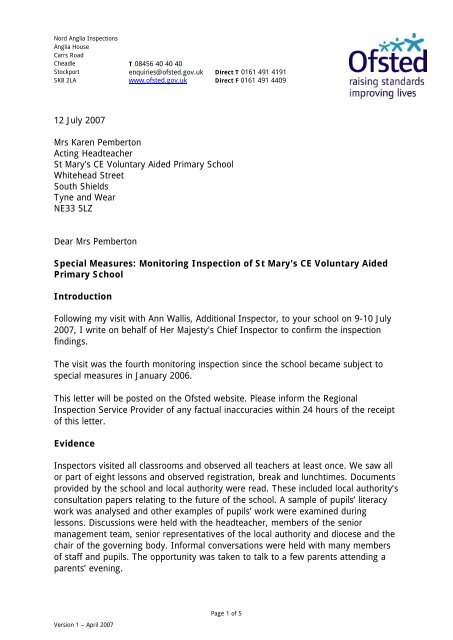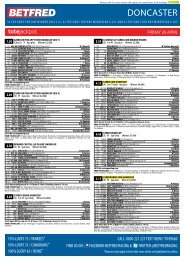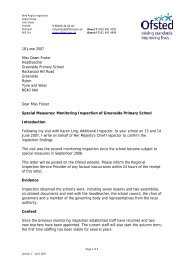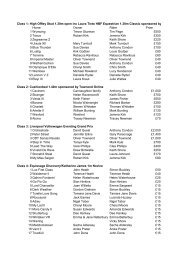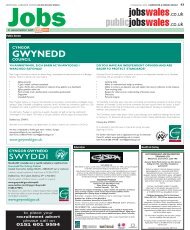12 July 2007 Mrs Karen Pemberton Acting Headteacher ... - icNetwork
12 July 2007 Mrs Karen Pemberton Acting Headteacher ... - icNetwork
12 July 2007 Mrs Karen Pemberton Acting Headteacher ... - icNetwork
Create successful ePaper yourself
Turn your PDF publications into a flip-book with our unique Google optimized e-Paper software.
Nord Anglia Inspections<br />
Anglia House<br />
Carrs Road<br />
Cheadle<br />
Stockport<br />
SK8 2LA<br />
T 08456 40 40 40<br />
enquiries@ofsted.gov.uk<br />
www.ofsted.gov.uk<br />
Direct T 0161 491 4191<br />
Direct F 0161 491 4409<br />
<strong>12</strong> <strong>July</strong> <strong>2007</strong><br />
<strong>Mrs</strong> <strong>Karen</strong> <strong>Pemberton</strong><br />
<strong>Acting</strong> <strong>Headteacher</strong><br />
St Mary's CE Voluntary Aided Primary School<br />
Whitehead Street<br />
South Shields<br />
Tyne and Wear<br />
NE33 5LZ<br />
Dear <strong>Mrs</strong> <strong>Pemberton</strong><br />
Special Measures: Monitoring Inspection of St Mary's CE Voluntary Aided<br />
Primary School<br />
Introduction<br />
Following my visit with Ann Wallis, Additional Inspector, to your school on 9-10 <strong>July</strong><br />
<strong>2007</strong>, I write on behalf of Her Majesty's Chief Inspector to confirm the inspection<br />
findings.<br />
The visit was the fourth monitoring inspection since the school became subject to<br />
special measures in January 2006.<br />
This letter will be posted on the Ofsted website. Please inform the Regional<br />
Inspection Service Provider of any factual inaccuracies within 24 hours of the receipt<br />
of this letter.<br />
Evidence<br />
Inspectors visited all classrooms and observed all teachers at least once. We saw all<br />
or part of eight lessons and observed registration, break and lunchtimes. Documents<br />
provided by the school and local authority were read. These included local authority’s<br />
consultation papers relating to the future of the school. A sample of pupils’ literacy<br />
work was analysed and other examples of pupils’ work were examined during<br />
lessons. Discussions were held with the headteacher, members of the senior<br />
management team, senior representatives of the local authority and diocese and the<br />
chair of the governing body. Informal conversations were held with many members<br />
of staff and pupils. The opportunity was taken to talk to a few parents attending a<br />
parents’ evening.<br />
Version 1 – April <strong>2007</strong><br />
Page 1 of 5
Context<br />
Key staff, absent at the time of the last visit, have returned to work. The school is<br />
now mainly staffed with teachers who have permanent contracts. The next school<br />
year should start with all teachers on permanent contracts. The school remains<br />
involved in a local authority review of primary places. Proposals for its possible<br />
closure have been made public and consultation procedures have started. The school<br />
roll has risen to <strong>12</strong>8, including 22 children in the Nursery but numbers will fall when<br />
26 Year 6 pupils leave at the end of this term, to be replaced by 11 entering the<br />
Reception year. Pupil mobility is increasing. All recent admissions have been pupils<br />
with learning difficulties.<br />
Achievement and standards<br />
Most pupils are now making satisfactory progress because teaching has improved.<br />
The pupils made at least satisfactory progress in all the lessons seen. This<br />
corresponds with the findings of monitoring by the headteacher and local authority.<br />
In English, this is because teachers are using the results of improved assessment<br />
procedures to match work more closely to individual ability and allow pupils to build<br />
more effectively on previous learning. Subject leadership in English has also<br />
improved. There remains the legacy of inadequate teaching in the past and, as a<br />
result, standards remain well below national expectations and are inadequate. Year 6<br />
pupils narrowly missed projected targets for English this year, by the equivalent of<br />
one pupil failing to reach Level 4. Provisional results show that targets for<br />
mathematics and science have also been missed. The interpretation of data provided<br />
by the school indicates that Year 5 pupils are achieving satisfactorily and are on<br />
course to meet higher targets next year. Over recent years there has been no clear<br />
trend in standards in English. Value added data, however tend, to show a slightly<br />
upward trend in achievement in English.<br />
Progress on the areas for improvement identified by the inspection in January 2006:<br />
Raise standards in English by matching the work pupils do more closely to their<br />
prior learning – satisfactory<br />
Personal development and well-being<br />
There have been satisfactory improvements in pupils’ personal development and<br />
well-being since the previous visit. This is most marked in attendance, where there<br />
has been good improvement. Attendance is now very close to the national average.<br />
With more stability in staffing, pupils’ behaviour has improved and is satisfactory.<br />
Pupils are increasingly being taught by familiar figures, who are more consistent in<br />
implementing the school’s system for managing behaviour. There have been no<br />
exclusions since the previous visit and there are fewer lessons where misbehaviour<br />
interferes with learning. Better teaching, with a wider range of learning activities to<br />
Page 2 of 5
capture pupils’ interest, has contributed to this. A few pupils have short attention<br />
spans and quickly become restless when asked to listen for long periods in lessons<br />
and assemblies. Pupils of all age groups share play equipment sensibly at breaks and<br />
lunchtimes. The acquisition of a substantial amount of new play resources has<br />
contributed well to this.<br />
Quality of provision<br />
The return of established teachers and a much-diminished reliance on temporary<br />
staff have contributed to satisfactory improvements in teaching. This is helping pupils<br />
to make better progress in lessons. Sixteen lessons have been monitored by the<br />
headteacher or the local authority since the previous visit and in all of them teaching<br />
was judged to be at least satisfactory. This was also the case in lessons seen by<br />
inspectors. An increasing amount of teaching across the whole school is good, but<br />
only the Year 2 class is consistently well taught. Support from an early years<br />
consultant is leading to improvements in teaching in the Foundation Stage. This is<br />
characterised by better planning and assessment and has been greatly helped by<br />
redesign and refurbishment of the accommodation to create an environment much<br />
better suited to the learning needs of young children.<br />
Teachers are becoming increasingly effective in interpreting the planned curriculum.<br />
This is helping them to plan and teach lessons which build more effectively upon<br />
pupils’ previous learning. More accurate and reliable assessment information is<br />
helping teachers to set pupils work that is better matched to their individual ability,<br />
and often with a higher degree of challenge than previously. The quality of academic<br />
guidance offered to pupils through the marking of their work is very variable. That<br />
for Year 2 sets a good example to be more widely followed. Here, the teacher offers<br />
pupils supportive advice, explaining clearly what they have done well and how they<br />
could improve their work. In some other classes, intermittent marking tends to<br />
congratulate or admonish without explaining why.<br />
With more consistent teaching, the reorganised and improved curriculum is now<br />
being taught more effectively than previously. As a result, pupils are increasingly<br />
motivated, helped in some cases by interesting topic work, which straddles many<br />
subjects. Most pupils say learning has become more enjoyable. Pupils continue to be<br />
well cared for, and improved behaviour contributes to the school becoming a more<br />
settled and safer place. Inspectors brought one health-and-safety issue, relating to<br />
the nursery, to the attention of the headteacher. Aside from teachers’ marking of<br />
pupils’ work, the assessment and tracking of pupils’ progress continue to improve,<br />
giving staff the information they need to help pupils to improve their work and to set<br />
increasingly challenging and realistic targets for future achievement.<br />
Page 3 of 5
Progress on the areas for improvement identified by the inspection in January 2006:<br />
• Tackle underachievement through improvements to the quality of<br />
teaching and learning, the establishment of higher expectations, the<br />
consistent implementation of assessment procedures, and by giving<br />
clear guidance to the pupils – satisfactory<br />
Leadership and management<br />
The acting headteacher remains resolute in addressing the school’s weaknesses and<br />
maintaining the drive to raise standards. Satisfactory progress has been made in<br />
strengthening leadership and management since the previous visit, and a sense of<br />
teamwork is emerging. The momentum of improvement is picking up, following<br />
serious decline at the time of the previous visit. Key senior staff have returned to the<br />
school following lengthy periods of absence. They are contributing to school<br />
improvement by accepting increasing responsibility for their duties. They have been<br />
supported through the part-time secondment of an experienced deputy headteacher,<br />
who has contributed to professional development in assessment and subject<br />
leadership. Sufficient progress has been made for the acting headteacher to view this<br />
arrangement as no longer necessary. Subject leadership of English, in particular, has<br />
improved and this has contributed to pupils’ faster progress. The acting<br />
headteacher’s monitoring of teaching remains good and has contributed significantly<br />
to improvement. Senior staff have also started to contribute a little to the monitoring<br />
process. Most importantly, with stability returning to staffing, it is permanent, rather<br />
than temporary teachers who are benefiting from good advice. This is increasing the<br />
school’s capacity to improve further.<br />
Progress on the areas for improvement identified by the inspection in January 2006:<br />
• Strengthen the school’s leadership and management, and establish<br />
strong teamwork and a clear sense of direction for improvement –<br />
satisfactory<br />
External support<br />
Support from the local authority has been reduced in line with the school’s increasing<br />
capacity to manage its own improvement. The external support that remains has<br />
been well targeted and has been effective; for example by bringing about<br />
improvements in Foundation Stage provision and through considerable support in<br />
resolving personnel issues. Furthermore, matters regarding the future of the school<br />
have been clarified and meetings for parents regarding the proposed re-organisation,<br />
involving a neighbouring faith school, are under way.<br />
Page 4 of 5
Additional issues<br />
Take urgent action with the local authority and diocese to resolve high levels of staff<br />
absence and ensure that the school has access to a good, secure staff team –<br />
satisfactory progress<br />
Ensure that a reliable leadership team is in place to offer support to the headteacher<br />
by contributing more to school improvement – satisfactory progress<br />
Main Judgements<br />
Progress since being subject to special measures– satisfactory<br />
Progress since previous monitoring inspection – satisfactory<br />
Newly qualified teachers may not be appointed.<br />
I am copying this letter to the Secretary of State, the chair of governors, the Diocese<br />
of Durham and the Director of Lifelong Learning & Leisure for South Tyneside Local<br />
Authority.<br />
Yours sincerely<br />
Alastair Younger<br />
Additional Inspector<br />
Page 5 of 5


